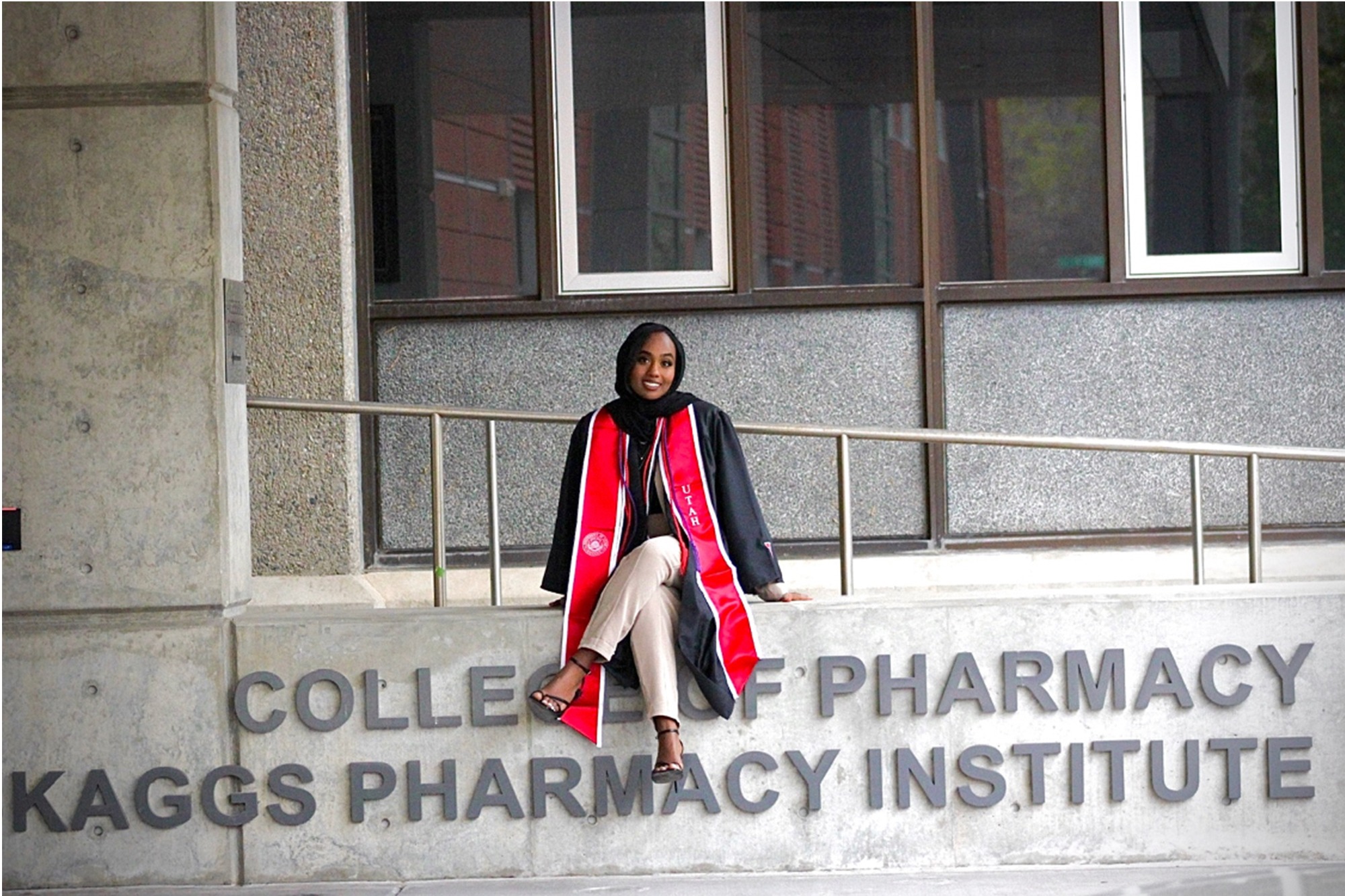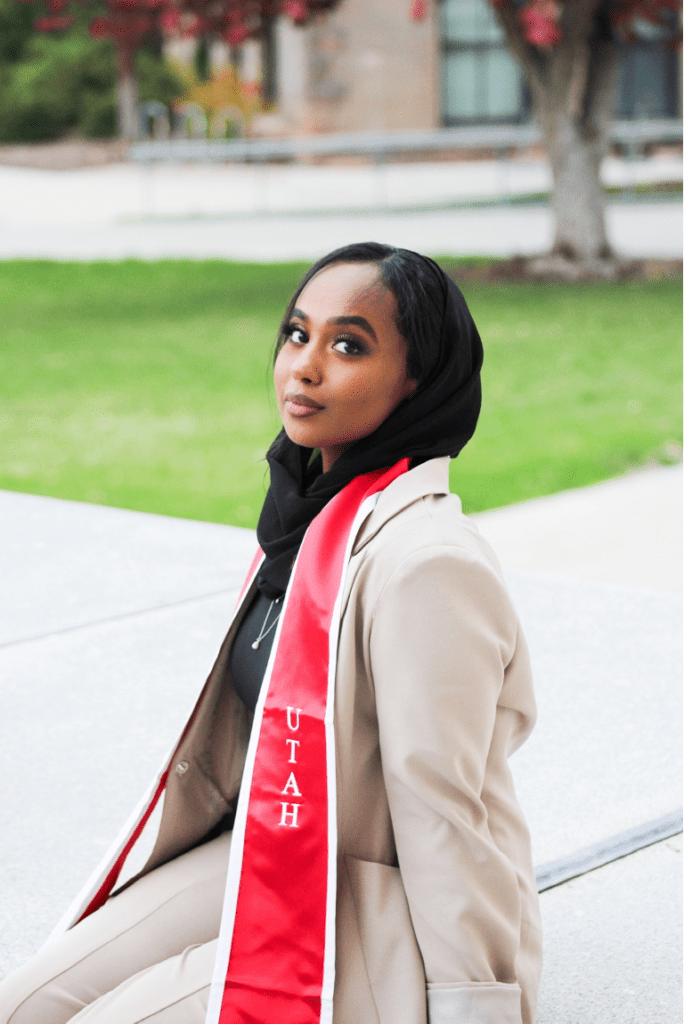
In the office of the UofU President, now, currently occupied by Taylor Randall, Presidential Interns are students provided with an unparalleled opportunity to learn from and collaborate with the president and other university administrators. In August 2018, Ilham Batar, BS’21, was enlisted in this prestigious group.
“In May 2019, I was appointed as a co-leader of the program and transformed it from an ambassadorship to an internship,” she says. “As a lead intern, I hosted and planned weekly seminars that included speakers from our University administration in order to build extensive community education for my fellow interns.”
Now a first-year Pharmacy student at the U, Batar remembers fondly that she and her cohorts participated in collaborative projects with the President surrounding campus safety, financial relief, and diversity efforts for the student body. “By working alongside [outgoing] President [Ruth] Watkins, I was given real outlook on the University which in turn changed my whole perception on higher education.”
Batar helped organize a higher education leadership trip to the University of Southern California in September 2019. The goal was to understand national campus climate resolutions and implement positive findings at her own institution.
“Being a part of the presidential intern program has definitely been a life-changing opportunity that has allowed me to reflect on how I want to become a strong leader in my community,” she says. “As a co-lead of a cohort, I was able to build myself as a leader and create strong relationships and enhance professional development within my cohort.”
In a sense, the ambassadorship-turned-internship was icing on the cake, so to speak, to an auspicious academic career as an undergraduate in biology at the University of Utah. And the ACCESS scholarship program played a critical role.
“When I graduated high school, I had no idea what kind of career I wanted to pursue,” Batar recalls. “One of my high school counselors encouraged me to apply to the ACCESS program in order for me to ease my transition from high school to University.” She was accepted into the program in 2017 and refers to it as “a transformative experience. I never knew the power that research held until the ACCESS program was able to give me the chance to work in the realm of research.” She says she loved the idea of the complexity of biology and learning how all living things depend and rely on one another to survive–not unlike society at large.

The same year Batar began working as an undergraduate research assistant for the Lamb Lab in the Department of Pathology. There she began working on a project designing a probiotic yeast called Saccharomyces boulardii to “stick” onto the Peyer’s patches (groupings of lymphoid follicles in the mucus membrane that lines the small intestine), to deliver vaccines. “I then moved [on to] projects to study cerebral malaria,” she says, “by investigating the role that astrocytes play in controlling the integrity of the blood brain barrier.”
Batar says that working in the Lamb Lab is what sparked her interest and love for science. “I have been able to develop many skills, like attention to detail, critical thinking, time management, and improvement of my oral communication skills.” Armed with this new and valuable skill set, she was able to present her research at the 2018 ACCESS symposium as well as present her progress at weekly lab meetings to her colleagues. “My experiences undertaking research in this lab is the main reason why I pursued my undergraduate degree in Biology,” she says.
“This experience was one of a kind, given the fact that not many freshmen undergraduate students get to work in such a prestigious research lab.” The experience, she says, was clearly augmented by her regular attendance at the Life Sciences Summer Undergraduate Research Program at the University of Minnesota working under Dr. Julie Olson. There she worked on a project that models multiple sclerosis in mice using Theiler’s murine encephalomyelitis virus (TMEV). Finding ways to study TMEV viruses to potentially develop drugs to combat them has always been an interest of hers.
As a first-generation student, Batar is quick to state that she carries on her parents’ story which, she says, makes her highly appreciate her education. “My parents fled their war-torn country of Somalia and settled in Utah with hopes of giving my siblings and me a better life. My parents did not have the luxury to continue and obtain their education since they had the responsibility to provide for our family. While my parents had limited knowledge of higher education, they knew the value it holds.”
Not surprisingly, perhaps, Batar is now driven to help her community. It is “what motivates me every single day,” she adds. “When my family settled [here], we were fortunate to receive aid from so many individuals that have impacted our lives. We have built a community and home here in Utah, but I have come to realize that Utah lacks [diverse] representation in the healthcare field, especially in the pharmacy realm.”
Enter the U’s School of Biological Sciences, which out of all the academic units in the College of Science, has actually achieved gender parity, though the School is now more determined than ever to attract diversity in other areas as well. After graduation last May Batar entered graduate school to become a Doctor of Pharmacy.
“I intend to make an impact on the lives of my patients by providing patient-centered care focused on optimizing medication therapies. I grew up in a culture where helping others comes naturally. This drives me to work twice as hard towards achieving my goals in pursuing a career in pharmacy.”
As an aspiring Pharmacist, Batar knows how difficult this next step in her education will be. Despite the long and hard days that lie ahead, she knows that she “will create the unimaginable for the world around me as a pharmacist.”
She is currently a pharmacy intern at the University of Utah Hospital.
In a sense, Batar’s journey from first-year ACCESS student, through her time as Presidential Intern and now into Pharmacy School has been a long haul. But perhaps it hasn’t seemed that way to her, considering her enduring attitude borne of her parents’ continuing story and her opportunity at the U, along with her inherent intelligence and ethic of hard work.
“The University of Utah holds many learning opportunities,” Batar says, “but the most beneficial learning opportunities to me are being able to get out of my comfort zone, learning to adapt in new environments and learning from new individuals.” Getting out of a comfort zone was clearly challenging but rewarding, and rewarding not just for Ilham Batar.
Laura Snow, chief of staff to the president, says of Batar, “Simply stated: Ilham is fabulous! While the U certainly influenced and shaped Ilham in positive ways, I can attest the impact was mutual. Ilham made the U–and all of us fortunate to have crossed her path here–better! She exemplifies the U’s best and brightest in every way and is an outstanding example of what is possible here.”
The “unimaginable” seems to be on the brink, now, of not only the wholly imagined, but of reality.
By David Pace
Our undergraduates rely on research scholarships, including ACCESS and the Science Research Initiative, to advance their academic careers. Alumni and friends of SBS continue to support these critical portals into student success. Thank you!
